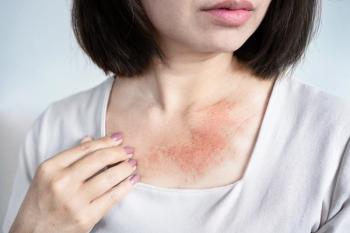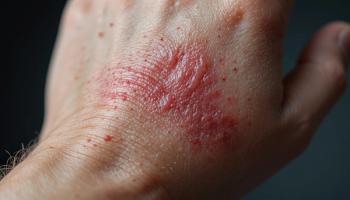
Gary Falcetano, PA-C, AE-C, discussed the correlation between climate change and allergy health risks.

Cameron Santoro is an associate editor for The American Journal of Managed Care® (AJMC®), AJMC.com, and The Center for Biosimilars®.

Gary Falcetano, PA-C, AE-C, discussed the correlation between climate change and allergy health risks.

RIsing costs for therapies and inequities in reimbursement for genomic testing have created financial barriers for patients, according to appearing experts in Detroit, Michigan, on July 10, 2025.

Cutting-edge cancer therapies and innovative care models that advance patient access and significantly reduce health care costs took center stage at the Institute of Value-Based Medicine (IVBM) event in Minneapolis, Minnesota.

Identifying specific biomarkers and clinical characteristics is crucial for predicting a patient's response to both existing and emerging treatments for chronic spontaneous urticaria, thereby moving toward a more personalized approach to care.

The treatment of pediatric obstructive sleep apnea syndrome is moving toward a personalized, multidisciplinary approach that combines surgical options with a growing number of nonsurgical alternatives, to better address the unique needs of each child.

Machine learning holds promise for optimizing treatment strategies and potentially improving outcomes in respiratory failure but future research and development are necessary to fully realize its potential in clinical practice.

Angel Qin, MD, identified the critical role of immunotherapy timing and shared decision-making in small cell lung cancer while also addressing the need for more broadly applicable treatments and personalized care.

Recent clinical trials like ADRIATIC and IMforte are shaping the future of small cell lung cancer (SCLC) treatment, explained Angel Qin, MD. She also emphasized the growing role of immunotherapy in adjuvant and maintenance therapies.

Chronic spontaneous urticaria places a heavier burden on patients than atopic dermatitis and psoriasis, leading to a worse quality of life and higher health care costs, underscoring the critical need for better treatments.

Hadar Avihai Lev-Tov, MD, argues that integrating dermatologists into multidisciplinary health care teams is crucial for providing comprehensive patient care.

The efficacy and safety of both approved and investigational drugs for moderate to severe hidradenitis suppurativa offer valuable evidence to guide clinical decision-making in a field where head-to-head trials are largely absent.

Despite their devastating global impact, chronic respiratory diseases remain a hidden threat in low- and middle-income countries, often going undiagnosed in adults who are already battling other noncommunicable diseases.

National Immunization Awareness Month highlights the importance of lifelong vaccination to prevent diseases, a practice that has averted millions of deaths, proven to be a cost-effective public health strategy, and offers crucial protection even to individuals who are immunocompromised.

Large language models (LLMs) such as GPT-3.5 and GPT-4 may offer a solution to the costly and inefficient process of manual clinical trial screening, which is often hindered by the inability of structured electronic health record data to capture all necessary criteria.

President Donald Trump has sent letters to pharmaceutical companies, aiming to compel them to lower drug prices in the US to match the lowest prices offered in other developed nations, a move that could significantly reduce costs and disrupt the current system of pharmacy benefit managers.

A significant number of patients with cancer, caregivers, and health care professionals face significant disparities in legal issues, with the most common needs revolving around health insurance, finances, employment, and disability insurance.

When updated food allergy prevention guidelines were directly provided to families, they led to earlier allergen introduction in infants and significantly reduced the prevalence of IgE-mediated peanut, egg, and cow's milk allergies.

Hadar Avihai Lev-Tov, MD, advocates for a holistic approach to wound care, emphasizing that chronic ulcers often signal underlying systemic health issues requiring a comprehensive patient assessment to achieve effective and potentially life-saving treatment.

Patients with chronic spontaneous urticaria experience inadequate symptom control and significant emotional burdens despite various treatment approaches, highlighting an urgent need for more effective and sustained therapies to improve their quality of life.

Hadar Avihai Lev-Tov, MD, asserts that advancements in teledermatology and artificial intelligence (AI)–powered diagnostic tools are crucial for improving health care efficiency and patient access within managed care.

The AllergyAware e-learning course effectively trained school personnel on anaphylaxis management, significantly improving their knowledge and confidence in using epinephrine auto-injectors, despite some technical and pacing issues reported by users.

Rebecca Chacko, MD, discussed exciting advancements in breast cancer care and the future role of emerging therapeutic strategies for early recurrence detection, as part of her panelist role at the Detroit Institute for Value-Based Medicine.

Rebecca Chacko, MD, discusses key breast cancer care challenges, including treatment access delays and the importance of open patient communication, as highlighted at the Detroit Institute for Value-Based Medicine session on unmet needs.

Respiratory syncytial virus (RSV) poses a significant, often overlooked, risk for serious cardiovascular complications in older adults, underscoring the need for vaccination in this population regardless of their preexisting health conditions.

The rapidly increasing prescriptions for expensive specialty medications, rather than their price growth, are the primary driver of escalating dermatology Medicare Part D expenditures, necessitating policies that balance innovation, access, and affordability.

National Minority Mental Health Month emphasizes the persistent mental health disparities among US racial and ethnic minorities, stemming from lower access to services, lack of culturally competent providers, discrimination, and medical mistrust, underscoring the need for dedicated resources and community action.

The new Blueprint for Patient-Centered Value Research offers a roadmap for embedding patient voices throughout every stage of the research journey to foster more equitable, transparent, and responsive health care systems.

Despite offering significant protection against severe COVID-19, patients with cancer, a high-risk group, showed low uptake of booster vaccinations.

Chronic rhinosinusitis with nasal polyps increases the likelihood of developing coexisting conditions, such as asthma, underscoring the need for more effective, comprehensive treatments.

Air pollution exposure, both before and after birth, significantly escalates the risk of respiratory infections in children.

Published: May 28th 2025 | Updated:

Published: April 19th 2024 | Updated:

Published: March 13th 2024 | Updated:

Published: March 9th 2025 | Updated:

Published: August 28th 2024 | Updated:

Published: September 26th 2024 | Updated:

259 Prospect Plains Rd, Bldg H
Cranbury, NJ 08512
© 2025 MJH Life Sciences®
All rights reserved.
